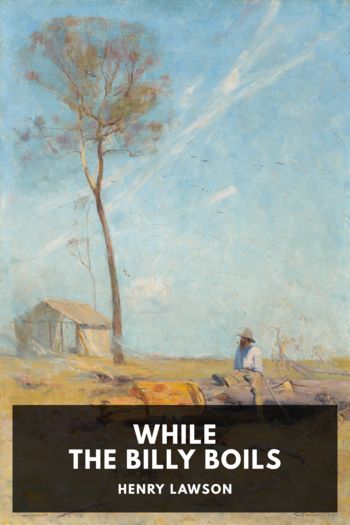While the Billy Boils - Henry Lawson (the kiss of deception read online .TXT) 📗

- Author: Henry Lawson
Book online «While the Billy Boils - Henry Lawson (the kiss of deception read online .TXT) 📗». Author Henry Lawson
But the blows slacken again as another vision rises before him. It is Ballarat now. He is working in a shallow claim at Eureka, his brother by his side. The brother looks pale and ill, for he has been up all night dancing and drinking. Out behind them is the line of blue hills; in front is the famous Bakery Hill, and down to the left Golden Point. Two mounted troopers are riding up over Specimen Hill. What do they want?
They take the brother away, handcuffed. Manslaughter last night. Cause—drink and jealousy.
The vision is gone again. Thud, thud, goes the pick; it counts the years that follow—one, two, three, four, up to twenty, and then it stops for the next scene—a selection on the banks of a bright river in New South Wales. The little homestead is surrounded by vines and fruit-trees. Many swarms of bees work under the shade of the trees, and a crop of wheat is nearly ripe on the hillside.
A man and a boy are engaged in clearing a paddock just below the homestead. They are father and son; the son, a boy of about seventeen, is the image of his father.
Horses’ feet again! Here comes Nemesis in mounted troopers’ uniform.
The mail was stuck up last night about five miles away, and a refractory passenger shot. The son had been out “possum shooting” all night with some friends.
The troopers take the son away handcuffed: “Robbery under arms.”
The father was taking out a stump when the troopers came. His foot is still resting on the spade, which is half driven home. He watches the troopers take the boy up to the house, and then, driving the spade to its full depth, he turns up another sod. The troopers reach the door of the homestead; but still he digs steadily, and does not seem to hear his wife’s cry of despair. The troopers search the boy’s room and bring out some clothing in two bundles; but still the father digs. They have saddled up one of the farm horses and made the boy mount. The father digs. They ride off along the ridge with the boy between them. The father never lifts his eyes; the hole widens round the stump; he digs away till the brave little wife comes and takes him gently by the arm. He half rouses himself and follows her to the house like an obedient dog.
Trial and disgrace follow, and then other misfortunes, pleuro among the cattle, drought, and poverty.
Thud, thud, thud again! But it is not the sound of the fossicker’s pick—it is the fall of sods on his wife’s coffin.
It is a little bush cemetery, and he stands stonily watching them fill up her grave. She died of a broken heart and shame. “I can’t bear disgrace! I can’t bear disgrace!” she had moaned all these six weary years—for the poor are often proud.
But he lives on, for it takes a lot to break a man’s heart. He holds up his head and toils on for the sake of a child that is left, and that child is—Isley.
And now the fossicker seems to see a vision of the future. He seems to be standing somewhere, an old, old man, with a younger one at his side; the younger one has Isley’s face. Horses’ feet again! Ah, God! Nemesis once more in troopers’ uniform!
The fossicker falls on his knees in the mud and clay at the bottom of the drive, and prays Heaven to take his last child ere Nemesis comes for him.
Long Tom Hopkins had been known on the diggings as “Tom the Devil.” His profile at least from one side, certainly did recall that of the sarcastic Mephistopheles; but the other side, like his true character, was by no means a devil’s. His physiognomy had been much damaged, and one eye removed by the premature explosion of a blast in some old Ballarat mine. The blind eye was covered with a green patch, which gave a sardonic appearance to the remaining features.
He was a stupid, heavy, good-natured Englishman. He stuttered a little, and had a peculiar habit of wedging the monosyllable “why” into his conversation at times when it served no other purpose than to fill up the pauses caused by his stuttering; but this by no means assisted him in his speech, for he often stuttered over the “why” itself.
The sun was getting low down, and its yellow rays reached far up among the saplings of Golden Gully when Tom appeared coming down by the path that ran under the western hill. He was dressed in the usual costume-cotton shirt, moleskin trousers, faded hat and waistcoat, and blucher boots. He carried a pick over his shoulder, the handle of which was run through the heft of a short shovel that hung down behind, and he had a big dish under his arm. He paused opposite the shaft with the windlass, and hailed the boy in his usual form of salutation.
“Look, see here Isley!”
“What is it, Tom?”
“I seed a young—why—magpie up in the scrub, and yer oughter be able to catch it.”
“Can’t leave the shaft; father’s b’low.”
“How did yer father know there was any—why—wash in the old shaft?”
“Seed old Corney in town Saturday, ’n’ he said thur was enough to make it worth while bailin’ out. Bin bailin’ all the mornin’.”
Tom came over, and letting his tools





Comments (0)